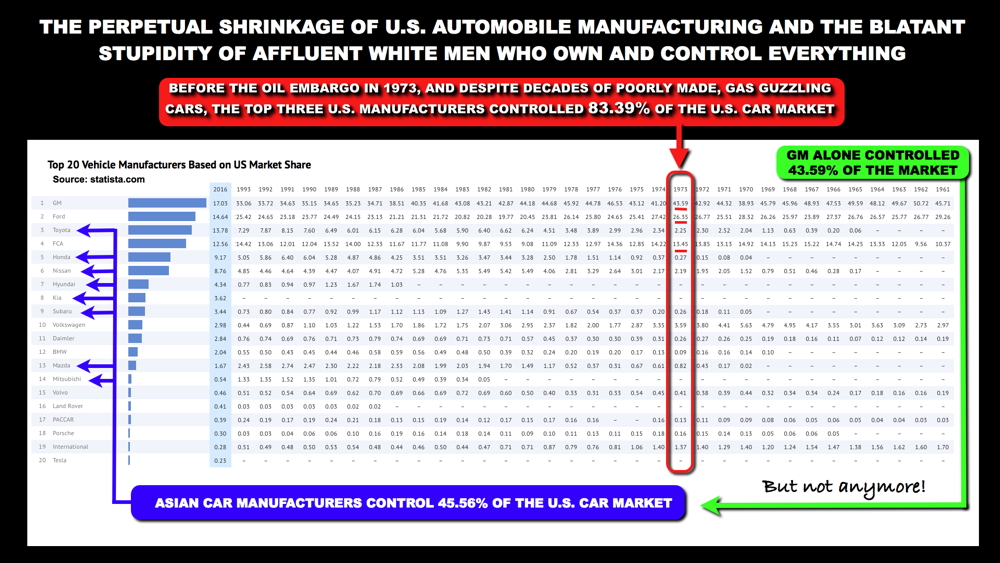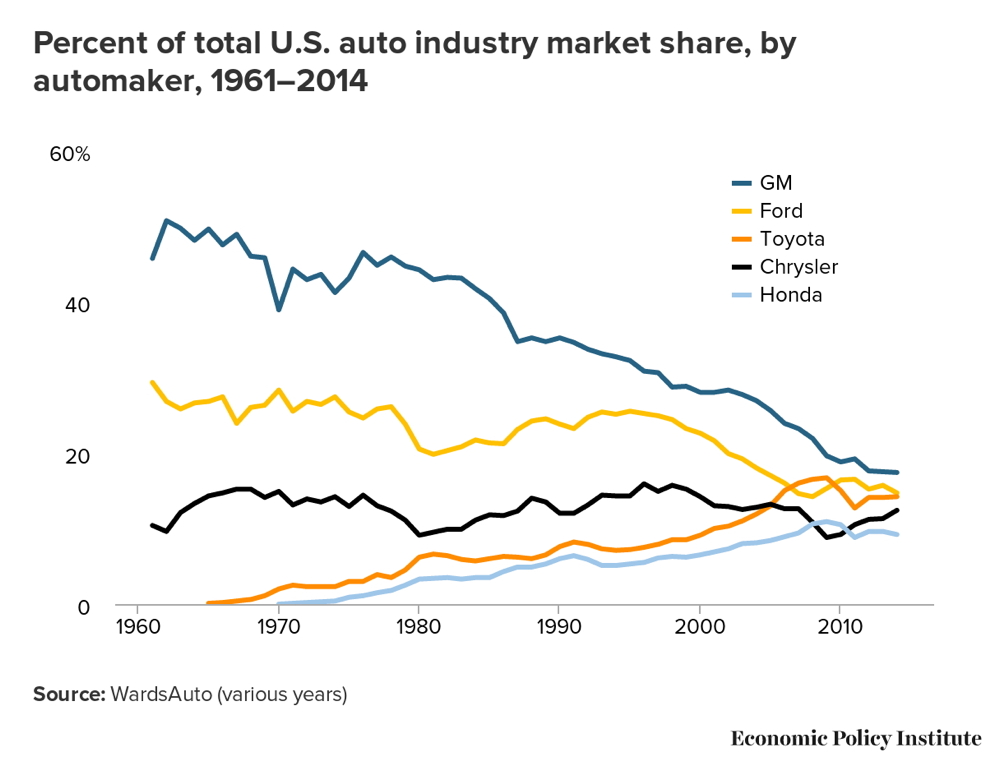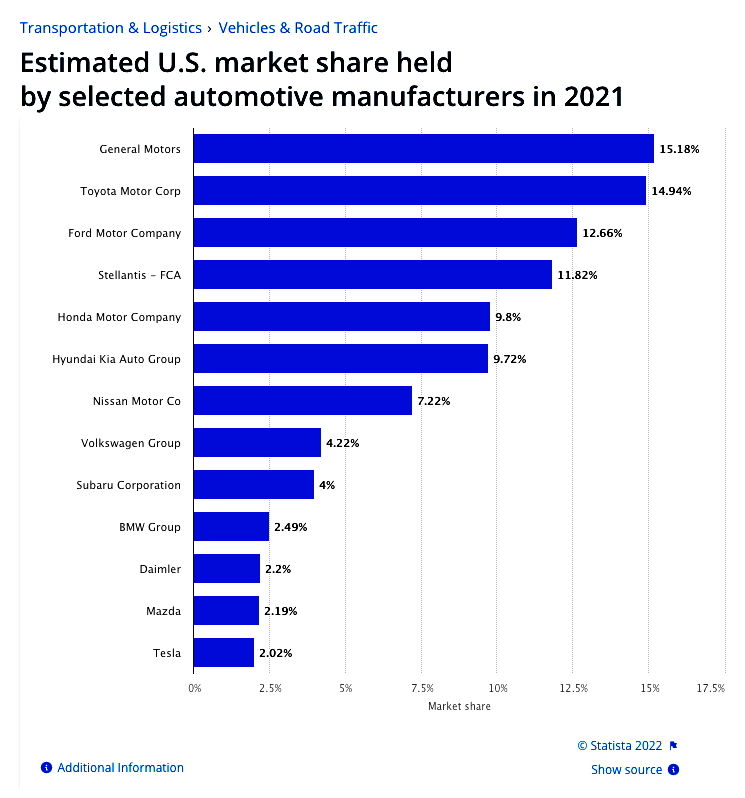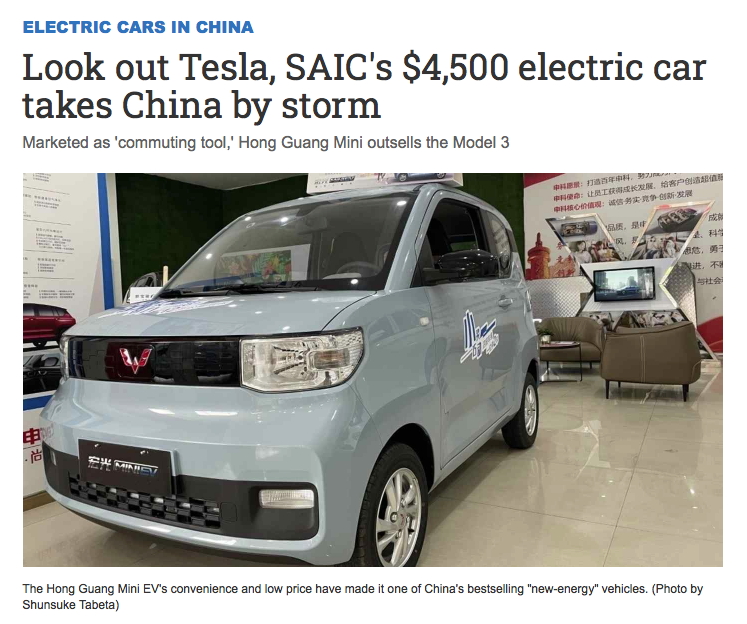
How Japan Ultimately Won WWII!
Yes, the United States of America won that short-term skirmish called World War II. In fact, leading into WWII the U.S. was the the biggest auto and truck manufacturer in Germany, bigger than Daimler or any other German carmaker. The biggest automotive manufacturer in Germany — indeed in all of Europe — was General Motors, which since 1929 had owned and operated the long-time German firm Opel. GM's Opel, infused with millions in GM cash and assembly-line know-how, produced some 40 percent of the vehicles in Germany and about 65 percent of its exports. Indeed, Opel dominated Germany's auto industry. However, when you look at the "big picture," or the "long ball" game, Japan continues to kick the U.S in the ass, and there's no end in sight.
Back in 1973, the Big Three (GM, Ford, Fiat/Chrysler) U.S. automotive companies used to "own" 83.39% of the U.S. domestic car market, which has been reduced to 44.23% as of 2017 and it's getting worse. Unfortunately, the same people who systematically refuse to hire qualified women and minorities are the same manufacturers who created mass unemployment for non-affluent White men, minorities, and women by exporting U.S. jobs and industries overseas, and by enabling Japan to steal 40% of the U.S. car market.
In fiscal 2017, six major Japanese automakers -- Toyota Motor, Nissan Motor, Honda Motor, Subaru, Mazda Motor and Mitsubishi Motors -- are aiming to sell a record 6.8 million vehicles combined, according to a Nikkei Inc. compilation of their business plans. The tally marks a roughly 3% rise on the year, enabling their aggregate market share to reach 40% for the first time -- aside from a one-off rise to that level in fiscal 2009, when American automakers suffered significant sales declines following the Lehman Brothers bankruptcy.
Source: http://www.asia.nikkei.com
Research papers and books were published that provided a very accurate template of: (1) what to expect from the Japanese and other competitors; and (2) how to build and sustain quality, and how to maintain market dominance; but they were ignored. For example:
CLICK IMAGE FOR AMAZON.COM CLICK IMAGE FOR AMAZON.COM CLICK IMAGE FOR AMAZON.COM The "code" of the samurai arose during the 12th century, and has prevailed ever since. This book, originally published in 1941, provides an excellent template of what to expect from Japan.
CLICK ABOVE IMAGE TO ENLARGE
Q: As objectively documented by EEO-1 and EEO-4 reports that validate the perpetual existence of the "Glass Ceiling," what else do Japanese firms do as well as most companies in the United States?
A: Japanese firms discriminate!
Ultimately, in the absence of change, the U.S. automotive industry will disappear. Tic toc, tic toc, tic toc . . .
Source: https://www.statista.com/statistics/249375/us-market-share-of-selected-automobile-manufacturers/
Again, ultimately, in the absence of change, the U.S. automotive industry will disappear. Tic toc, tic toc, tic toc . . . kboom!
Anyone with common sense could have predicted the demise of U.S. dominance in its own domestic automotive market, but as usual those rich, affluent, wealthy, ethnocentric White men who own everything and hold all the power, they ignored the warning signs. Warning signs? Again, for decades most U.S. cars were poorly made, just lousy, with "planned obsolesce" the dominant factor in manufacturing. To make matters worse, despite customer complaints, insurance complaints, "recommendations" from the U.S. National Highway Traffic Safety Administration, and scientific evidence on the higher value of "quality" over crap, nevertheless, quality didn't become "Job 1" for Ford Motor Company until it saw its market share plummet.American engineer, statistician, professor, author, lecturer, and management consultant William Edwards Deming's teachings and philosophy are clearly illustrated by examining the results after they were adopted by the Japanese automotive industry, and as the validated by the Ford-Mazda study. Ford Motor Company was simultaneously manufacturing a car model with transmissions made in Japan (by Mazda) and the United States (by Ford). Soon after the car model was on the market (c. 1950), Ford customers were requesting the model with Japanese transmissions over the US-made transmissions, and they were willing to wait for the Japanese model. As both transmissions were made to the same specifications, Ford engineers could not understand the customer preference for the model with Japanese transmissions. Finally, Ford engineers decided to take apart the two different transmissions. The American-made car parts were all within specified tolerance levels. However, the Japanese car parts were virtually identical to each other, and much closer to the nominal values for the parts—e.g., if a part was supposed to be one foot long, plus or minus 1/8 of an inch (300 mm ± 3 mm)—then the Japanese parts were all within 1/16 of an inch (1.5 mm), less variation. This made the Japanese cars run more smoothly and customers experienced fewer problems. Source: wikipedia
One would be wrong to think a spirit of "business and cultural recipocity" exist between the U.S. and Japan, and that cars made by GM, Ford, and Chrysler would sale just as easily as the sale of Japanese cars in the U.S. Nope. Again, those same rich, affluent, wealthy, and ethnocentric White men who own everything and hold all the power in the U.S. don't have a "cultural" clue on how to sale cars in Japan, and it's really pathetic.
As reported by motorbiscuit.com:
In Japan, dealerships build relationships with their customers, not only so that they can retain business over time, but to provide the best customer service experience possible. When the customers are ready to purchase a new car, the dealer will deliver a car for them to test drive and will even take care of the insurance as well. Additionally, car maintenance is "free" and the dealer will even pick up the car from the customer’s house and drop it back off after the service is done.
More than 95 percent of cars sold in Japan are from Japanese automakers and the rest are mostly made up of European luxury brands like Porsche and BMW.
The streets of Japan are very narrow and very crowded, which is why the class of mini cars, called “Kei cars,” are the most popular in Japan. A Kei car is a much smaller Mini Cooper. The bigger size of American cars is off-putting to Japanese consumers.
American automakers focus more on SUVs and trucks, which does not serve the Japanese market.
Japanese car buyers view American cars as big gas guzzlers that lack quality in comparison to products from their own brands.
As reported by theatlantic.com:U.S. companies have made inroads in countries like China that have more restrictive trade policies than Japan, in shorter amounts of time—General Motors now sells more cars in China than it does in the U.S., for example. (Although the market for cars in China is larger than it is in the U.S.) Japanese companies increased their presence in the U.S. market for decades, even after the U.S. asked Japan to impose voluntary export restraints, limiting its export of cars to the U.S., in 1981. (Those restraints led Japan to open up manufacturing facilities in the United States.) And foreign companies have begun to sell more cars in Japan, with few complaints about Japan’s trade policies. The number of imports of U.S. vehicles in Japan shrank 15 percent between 2013 and 2016, to 19,933, while imports from the European Union grew five percent in that time period, to 251,115, according to Urata. Brands like Mercedes-Benz and BMW saw sales grew 60 percent and 23 percent, respectively, between 2012 and 2016.
Walk into (a new BMW) dealership in Japan and you’ll encounter a separate coffee shop run by Nescafé where anyone, not just people interested in cars, can sit down at the many tables and order specialty coffee drinks and desserts from waiters. There are sleek cars and bicycles in a vast showroom, while another showroom sells car accessories and BMW memorabilia. The "brand" holds events on weekends, inviting children to come and play with remote-control cars on a track.“In Japan, everything is about hospitality,” Peter Kronschnabl, the CEO of BMW Group Japan and the chairperson of the European Business Council’s Automotive Committee and the Japan Automobile Importers Association, said “If you are not into this, it will be very difficult to succeed in the Japanese market.”
Perhaps, you haven't been paying attention, but given Japan's success in commandeering extremely large segments of the U.S. automotive market, China has been doing the exact same thing! Just like Lenovo acquired IBM's personal computer business in 2005 and acquired its Intel-based server business in 2014, all of the following companies are Chinese owned and controlled.
As reported by motorbiscuit.com, U.S. car manufacturers, and even other Asian-based car manufacturers, can't even launch a truly "consumer friendly" market for the sale of those newfangled electric cars as effectively as China.
2021 Chevy
Bolt2021 Tesla
Model 32021 Hyundai
Ioniq2021 Nissan
Leaf2021 Mini
Electric Hardtop$36,500 $39,990 $33,245 $31,670 $29,900 Here's China's response!
CLICK THE ABOVE IMAGE FOR MORE INFORMATION QUESTIONS:
With the Big Three's (GM, Ford, Fiat/Chrysler) share of the U.S. domestic car market in perpetual decline, is the U.S. car manufacturing industry doomed to be consumed (bought or merged) with a Japanese or Chinese company in the very near future?
Is GM and/or Ford and/or Fiat/Chrysler destined for the same fate as AMC Theatres, Lenovo, or especially, Firestone?
YEP, which is how Japan ultimately won WWII!
I welcome your feedback.
Trip Reynolds
trip.reynolds@yahoo.com
![]()
 |
Reynolds' Rap First Amendment to the United States Constitution - Congress shall make no law respecting an establishment of religion, or prohibiting the free exercise thereof; or abridging the freedom of speech, or of the press; or the right of the people peaceably to assemble, and to petition the Government for a redress of grievances. |




